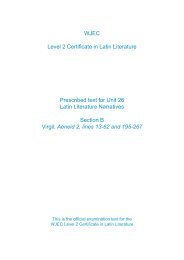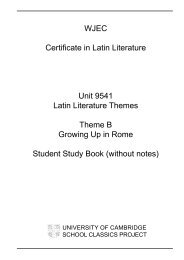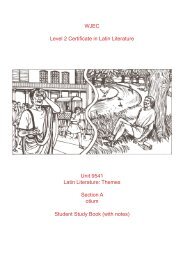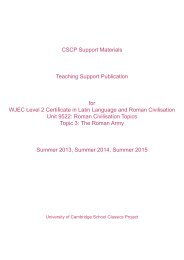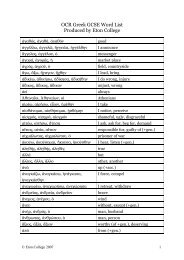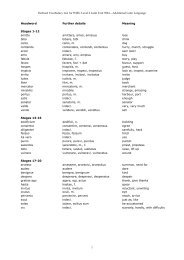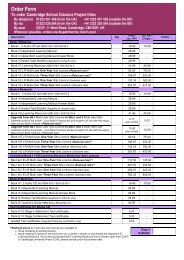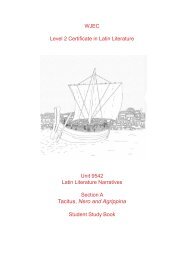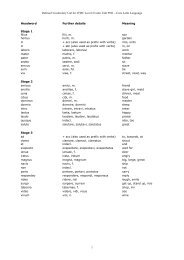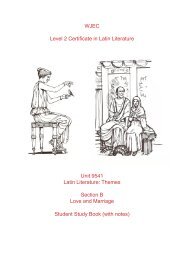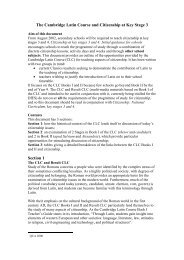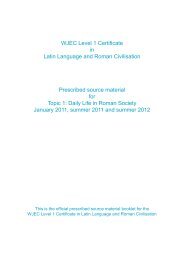KEY: 1T = CLC Textbook I; 2T = CLC Textbook II; 1I = Independent ...
KEY: 1T = CLC Textbook I; 2T = CLC Textbook II; 1I = Independent ...
KEY: 1T = CLC Textbook I; 2T = CLC Textbook II; 1I = Independent ...
You also want an ePaper? Increase the reach of your titles
YUMPU automatically turns print PDFs into web optimized ePapers that Google loves.
<strong>KEY</strong>: <strong>1T</strong> = <strong>CLC</strong> <strong>Textbook</strong> I; <strong>2T</strong> = <strong>CLC</strong> <strong>Textbook</strong> <strong>II</strong>; <strong>1I</strong> = <strong>Independent</strong> Learning Manual Book I; 2I = <strong>Independent</strong> Learning Manual Book <strong>II</strong>;<br />
1G = Teacher’s Guide Book I; 2G = Teachers’ Guide Book <strong>II</strong>; 1W = Worksheet Masters Book I; 2W = Worksheet Masters Book <strong>II</strong>. The<br />
numbers following the letter indicate the relevant page numbers. Asterisks denote activities for which modern comparison is explicitly suggested<br />
by the course.<br />
Legal and human rights and responsibilities underpinning society<br />
Topic Title Description Location<br />
Women’s role at<br />
home<br />
Metella English passage about Metella’s responsibilities. <strong>1T</strong>10<br />
Find out about Caecilius Question about Metella’s role as housekeeper. 1:9:2<br />
Caecilius and his<br />
Video including material about Metella’s role in life and a comparison with 1:10:1<br />
household*<br />
the life of women now.<br />
Rufilla Latin story about Rufilla’s life on a country estate. Discussion. <strong>2T</strong>25, 2G17<br />
Compose a letter from Rufilla describing her life on a country estate. 2G24<br />
Learning to read and write Video that tells students how girls were often taught household skills rather<br />
than literacy.<br />
10:4:2<br />
Women in public<br />
life<br />
The forum, law and trade Video including material about a priestess who was a public figure. 4:3:1<br />
Women- general The perfect woman Activity that involves working out which qualities the Romans considered<br />
suitable for a woman.<br />
7:5:3<br />
Freedmen’s jobs<br />
and rights<br />
Caecilius Introducing the life of Caecilius, a freedman. <strong>1T</strong>8-9<br />
Find out about Caecilius Questions about a freedman’s business dealings. 1:9:2<br />
Caecilius and his<br />
household<br />
Video about Caecilius’ household and business. 1:10:1<br />
Find out about Caecilius English information about manumission and freedmen’s rights and jobs. <strong>1T</strong>80-81<br />
Freeing a slave Video about freedmen’s rights and jobs. 6:4:5<br />
Slaves- voting Lucius Spurius Latin story about a slave disguising himself as a citizen in order to vote. <strong>1T</strong>151-153,
Pomponianus 11:8, 11:10,<br />
11:11<br />
Slaves’ rights Slaves and freedmen English information about slaves’ rights, tasks, treatment and manumission <strong>1T</strong>78-81,<br />
1G53-54<br />
coniuratio Latin story showing the execution of slave-guards for failing in their duty, <strong>2T</strong>7,<br />
without trial. Discuss the rights of slaves and Roman justice.<br />
2G9<br />
Bregans Latin story showing the punishment of a slave without trial.<br />
<strong>2T</strong>8-9<br />
Comprehension.<br />
Gladiatorial shows English information about slaves being forced to become gladiators. <strong>1T</strong>108<br />
Slaves’ rights Slaves and freedmen Thinking about slaves and manumission. <strong>1I</strong>31,<br />
The buying and<br />
selling of slaves<br />
The treatment of<br />
slaves<br />
venalicius Story about how slaves were bought and sold. Discussion.<br />
6:6:2<br />
<strong>1T</strong>31,<br />
3:6,<br />
1G35-36<br />
The life of a slave Activities about a slave’s fate at a slave auction or about a slave’s life. 1W6.5<br />
Salvius fundum inspicit Latin story showing the denial of food to a sick slave. Discuss conditions of <strong>2T</strong>12,<br />
farm and domestic slaves.<br />
2G12<br />
The slaves English description of harsh life of farm and mine slaves. Discuss. <strong>2T</strong>20, 2G14<br />
Searching for slaves Video about the lives of domestic slaves. 6:3:7<br />
Find out about Caecilius A question about the kinds of jobs done by domestic slaves. 1:9:2<br />
Caecilius and his<br />
household<br />
Video about slaves’ position and role in the familia. 1:10:1<br />
Learning to read and write Video including material on slaves’ role as paedagogi. 10:4:2<br />
What did slaves do? Collect together all the jobs done by Roman slaves. 6:3:8<br />
Romans and their slaves* Video about the wretched lives of slaves then and now. 6:3:1<br />
Slavery: then and now* Produce a report on modern slavery. 6:6:3
Basic aspects of the criminal justice system<br />
Topic Title Description Location<br />
Judges Salvius English description of Salvius’ position as a judge. <strong>2T</strong>21<br />
Trials in basilica Latin story demonstrating formal responses, burden of proof. Questions on <strong>1T</strong>44,<br />
the court procedure. Translation. Act.<br />
4:5,<br />
<strong>1I</strong>19, 1W4.3,<br />
1G41<br />
in apodyterio Latin story about thief explaining extenuating circumstances. English note. <strong>1T</strong>122, 9:10,<br />
1G70<br />
The forum, law and trade Pictures of the basilica and a trial on video. 4:3:1<br />
Diversity of national, regional, religious, and ethnic identities; the need for mutual respect and understanding<br />
Topic Title Description Location<br />
National identities British farms, Farms in Activity on why a British farmer would rebuild his house in the Roman 2W13.3,<br />
Roman Britain<br />
style.<br />
2I6<br />
The palace at Fishbourne Looking at evidence that the owner wanted his palace and garden to imitate<br />
those in Italy.<br />
2I33<br />
How many Briton learnt<br />
Latin?<br />
Activity on why Britons learnt Latin. 2W15.1<br />
controversia Latin story in the form of a debate, ‘Are the Romans better than the <strong>1T</strong>134-135,<br />
Greeks?’ Discuss emotional involvement of speakers in arguments. 10:2,<br />
Exercise checking understanding, looking at evidence and bias, translation. 10:3, 1G74,<br />
<strong>1I</strong>56<br />
The town of Pompeii Information about nationalities of merchants in Pompeii. <strong>1T</strong>36, 1G37<br />
Slaves and freedmen Information about nationalities of slaves in Pompeii. <strong>1T</strong>78<br />
ad aulam Latin story in which Salvius is gleeful at forcing the cart of two Britons into <strong>2T</strong>46-47,
a ditch. Imagine you are one of the two and give your account. Discuss his<br />
contemptuous attitude to the provincials.<br />
2G33, 2G26<br />
Model sentences Latin sentences in which slaves’ nationalities and master’s contrast. First<br />
reading.<br />
<strong>2T</strong>2-4, 2G7-8<br />
Suggested activity 2b Imagine you are a Briton who remembers the days before the Romans<br />
arrived.<br />
2G33<br />
tumultus I and <strong>II</strong>* Latin story about tensions between Egyptians and Greeks and Romans in <strong>2T</strong>78-79,<br />
Alexandria. Comprehension. Activities to aid understanding. Discuss the 2I39,<br />
maintenance of order in Alexandria. Discuss modern parallels of the<br />
tensions.<br />
2G45-46<br />
Discussion 3 Discuss contrasts between life in Pompeii, Britain and Alexandria 2G48<br />
Regional identities gladiatores, in arena and Latin stories about the growing tension between neighbouring towns at a <strong>1T</strong>100-103,<br />
venatio<br />
gladiatorial show. Discuss. Tacitus’ description in English.<br />
8:3,<br />
8:4,<br />
8:5,<br />
8:7,<br />
1G62-63,<br />
<strong>1T</strong>111<br />
Riot at Pompeii Video about the fight between rival fans at a gladiatorial show. 8:8:4<br />
in tablino Latin story in which Salvius admits to not trusting Pompeians. <strong>2T</strong>30,<br />
2G18<br />
tumultus I and <strong>II</strong>* Latin stories about tension between Greeks and Egyptians in the streets of <strong>2T</strong>78-79,<br />
Alexandria. Discuss racial conflict.<br />
2G45-46<br />
Alexandria English description of the multi-cultural nature of Alexandria <strong>2T</strong>89<br />
Religious identities Cultural background English description of Roman beliefs and practices about death. Discuss. <strong>2T</strong>93-95,<br />
material*<br />
Compare with modern beliefs.<br />
1G58<br />
The forum and religion Video about Roman worship and gods. 4:6:1<br />
Death and burial* Video looking at the death and burial rites of the Romans. Compare with<br />
now.<br />
7:5:2
Central and local government<br />
Tombs of Pompeii Video. 7:6:7<br />
The living and the dead Video about the dead sharing in the daily life of the living. 7:9:2<br />
The forum English description of the temples in the forum at Pompeii. <strong>1T</strong>50<br />
Fare for a journey* Activity about the journey which the dead were thought to make to reach<br />
the Elysian Fields. Compare Roman rituals with those in Britain today.<br />
7:9:1<br />
Then and now* Explore Roman religious beliefs and practices. Investigate a religion<br />
practised now and compare.<br />
7:5:1<br />
Ancient worship* English information panel about the worship of Isis. Comparison with 2I42<br />
religious worship today.<br />
The worship of Isis* English description of the worship of the Egyptian goddess Isis. Discuss<br />
and compare with Christianity.<br />
<strong>2T</strong>126-129,<br />
2I56, 2I60,<br />
2G68<br />
pompa Latin story about the procession of Isis. <strong>2T</strong>119-120<br />
Suggested activity Imagine you are a freedman attracted to the worship of Isis and explain<br />
why.<br />
2G70<br />
Topic Title Description Location<br />
Central<br />
government<br />
The riot at Pompeii, Riots* Glimpse of the emperor at the top of the chain of command. Modern-style<br />
newspaper article on the riot, referring to the role the Home Secretary and<br />
parliament would play now.<br />
Political life Video referring to the fact that local politics was thriving in Pompeii<br />
although the important decisions were made in Rome.<br />
The forum and religion Video with information about the presence of the emperor in the forum of<br />
Pompeii in the form of his shrine.<br />
The Romans in Britain Questions 1 and 2 are about Caesar’s and Claudius’ roles in conquering<br />
Britain.<br />
<strong>1T</strong>111, 8:8:4,<br />
8:8:5<br />
11:2:3<br />
Alexandria Glimpse of the emperor stepping in to settle disputes in Alexandria. <strong>2T</strong>89-90<br />
4:6:1<br />
2I14
Salvius English description of how Titus sent Salvius to help Agricola govern<br />
Britain.<br />
<strong>2T</strong>21<br />
Cogidubnus, king of the<br />
Regnenses<br />
English description of how Claudius made Cogidubnus king of his tribe. <strong>2T</strong>55-57<br />
tripodes argentei Latin story in which we hear of Cogidubnus’ gratitude to Claudius for<br />
making him king of his tribe.<br />
<strong>2T</strong>33-34<br />
caerimonia Latin story in which Cogidubnus makes a sacrifice to honour Claudius and <strong>2T</strong>48-49,<br />
promote his apotheosis. Comprehension questions. Discussion.<br />
2G26-28<br />
Suggested activity 1 Report to the emperor, to whom you are personally accountable, about a riot<br />
in Alexandria.<br />
2G50<br />
Cultural background Students are asked if they know of instances of corruption in public life 2G57<br />
material*<br />
now.<br />
Local government The forum*, The town of English information about the sites of business, religion and local<br />
<strong>1T</strong>48-51, 1G44,<br />
Pompeii, In Pompeii government in Pompeii. Label a plan of the forum. Compare with a 1G37, 1G42,<br />
modern town. Label a plan of Pompeii.<br />
<strong>1I</strong>14, <strong>1I</strong>20,<br />
4:3:2, <strong>1I</strong>3.6<br />
The forum and religion Video establishing the forum as the centre of local government and religion. 4:6:1<br />
Local government and English information panel. Discuss. <strong>1T</strong>156-159,<br />
elections<br />
1G83-84<br />
Cultural background Discuss corruption in Alexandria and ask students if they know of any 2G57<br />
material<br />
examples of corruption in public life now.<br />
in foro Latin story establishing the forum as the centre of social and business life in <strong>1T</strong>28,<br />
Pompeii.<br />
3:1,<br />
1G33
The public services they offer<br />
Title Description Location<br />
Theatre actores, in theatro Latin story describing the excitement of the day of a play. Questions on the<br />
story.<br />
The theatre at Pompeii* English section about plays and the type of people who watched them and<br />
staged them. Questions, including comparison with modern day<br />
entertainment.<br />
In the theatre 1 Questions about Roman theatres and plays. 5:6:8<br />
<strong>1T</strong>58,<br />
5:2,<br />
<strong>1I</strong>24, <strong>1T</strong>63,<br />
1W5.5<br />
<strong>1T</strong>64-67, <strong>1I</strong>25<br />
Gladiatorial shows Gladiatorial shows* English information about who went to shows, and how they were put on T107-11, 1G64and<br />
conducted. Discussion including comparison with modern<br />
entertainment.<br />
65, <strong>1I</strong>43<br />
The amphitheatre at<br />
Pompeii<br />
Video about the popularity of gladiatorial games. 8:2:2<br />
The gladiators Video about the position of gladiatorial shows in Roman society and who<br />
staged them and why. Fight reconstruction.<br />
8:5:2<br />
The animal games Video about the excitement at exotic animals in the gladiatorial arena. 8:8:1<br />
Why gladiatorial shows?* Questions about why the shows were enjoyed and whether we have<br />
anything similar now.<br />
8:2:4<br />
Could it happen today?* Explain why the Romans liked gladiatorial shows and whether we have 8:8:3<br />
anything like them today.<br />
Baths The baths* English information about a visit to the baths. Discuss. Label a set of<br />
baths. Activities about the Roman baths, including what the modern<br />
equivalent would be.<br />
<strong>1T</strong>124-127,<br />
1G70-71, <strong>1I</strong>49-<br />
50
The ritual of the baths* Video about a visit to the baths. Comparison with a modern sports centre. 9:2:1<br />
About the<br />
Questions about Roman baths, including what the modern equivalent would 9:2:3<br />
baths 2*<br />
be.<br />
The water supply An activity on how the water supply in Pompeii worked and who controlled<br />
it.<br />
9:6:3<br />
Schools Schools* English information about schooling provision in Pompeii. Questions. T140143, <strong>1I</strong>57,<br />
Make a school report for a Roman pupil. Discussion including comparison<br />
with modern education.<br />
1W10.3, 1G77<br />
Learning to read and<br />
write*<br />
Video about Roman education, comparing it with education today. 10:4:2<br />
rhetor Video about the final stage of Roman education. 10:7:4<br />
Searching for slaves Video mentioning that educated slaves could be teachers. 6:3:7<br />
Medicine remedium astrologi Latin story about the medical advice supplied by an astrologer. Discuss. <strong>2T</strong>133, 2G71-<br />
72<br />
Petro Latin story about the treatment given by a doctor. Discuss. <strong>2T</strong>134, 2G72-<br />
73<br />
astrologus victor I and <strong>II</strong> Latin story about the astrologer’s second attempt at treating Barbillus’ <strong>2T</strong>138-139,<br />
wound. Discuss.<br />
2G75-76<br />
Medicine and science*, English information panel. Discuss, and consider modern medical ethics. <strong>2T</strong>142-145,<br />
Medical instruments, Activities including a presentation on which of the scientific developments 2I71-72, 2G77,<br />
Petro’s case notes in ancient Alexandria is most important in today’s world. Writing up a<br />
doctor’s case notes.<br />
2G78, 2W20.4<br />
Searching for slaves Video mentioning that educated slaves could be doctors. 6:3:7<br />
General Local government quiz* Quiz on who provided public services in Pompeii and who provides them <strong>1I</strong>66,<br />
now.<br />
11:12:2<br />
Winning votes Activity about the kinds of services political candidates had to consider to<br />
attract votes.<br />
11:2:1<br />
The town of Pompeii* English section about the buildings in the town of Pompeii. Discussion,<br />
including comparison with a modern town.<br />
<strong>1T</strong>33-37, 1G37
How they are financed<br />
Topic Title Description Location<br />
Revenues from the<br />
empire<br />
The Romans in Britain Mention of taxes inflicted on the Britons by the Romans. <strong>2T</strong>38<br />
coniuratio Discussion of whether the emperor’s pressure on Salvius to increase the<br />
revenues makes Salvius a more sympathetic figure.<br />
2G8<br />
Egypt Egypt ensuring the corn supply to Rome. <strong>2T</strong>109<br />
Local taxes Local government and<br />
elections<br />
Mention of aediles’ control of local taxes. <strong>1T</strong>156<br />
Key characteristics of parliamentary and other forms of government<br />
Topic Title Description Location<br />
Rome as an<br />
imperial power<br />
The riot at Pompeii Emperor as having ultimate power over Pompeii. <strong>1T</strong>111,<br />
8:8:4<br />
The forum and religion Video including material on the divine emperor. 4:6:1<br />
tripodes argentei Latin story in which Anti-Loquax explains that Claudius gave his kingship<br />
to Cogidubnus.<br />
<strong>2T</strong>33-34<br />
caerimonia Latin story in which Cogidubnus honours Claudius and promotes his <strong>2T</strong>48-49, 2G26apotheosis.<br />
Comprehension.<br />
28<br />
Salvius English description of how the emperor furthered Salvius’ career. <strong>2T</strong>21<br />
Cogidubnus, king of the<br />
Regnenses<br />
English section about Claudius giving the kingship to Cogidubnus. <strong>2T</strong>55-57<br />
Egypt Emperor’s retaining personal control of Egypt. <strong>2T</strong>108-109
Alexandria Emperors role in quashing revolt in Alexandria. <strong>2T</strong>89-90<br />
Suggested activity 1 Write to the emperor, to whom you are accountable, explaining a riot in<br />
Alexandria.<br />
2G50<br />
The Romans in Britain Question 1 and 2 are about the emperors who conquered Britain. 2I14<br />
Electoral system and the importance of voting<br />
Topic Title Description Location<br />
Elections, voting Local government and<br />
elections<br />
English information panel. Discuss. Questions. <strong>1T</strong>156-159,<br />
1G83-84, <strong>1I</strong>62,<br />
<strong>1I</strong>63<br />
11:2:3<br />
office, then and now.<br />
<strong>1T</strong>148, 11:3,<br />
candidate. Questions.<br />
<strong>1I</strong>63<br />
<strong>1T</strong>149, 11:6,<br />
Political life* Video about how candidates appeal to voters and why they want to stand for<br />
Marcus et Quartus Latin story in which two brothers clash over who is the best political<br />
Sulla A sign-painter resolves their conflict, and himself profits in the process.<br />
Discuss. Questions.<br />
Lucius Spurius<br />
A series of Latin stories in which a slave pretends to be a citizen in order to<br />
Pomponianus<br />
get bribes for his vote from political candidates. Discuss. Questions.<br />
Suggested activities, Vote<br />
for who? (sic)<br />
Hold a mock election, examine some of the Pompeian graffiti and a<br />
comprehension on a Latin election speech.<br />
Winning votes Activity considering the kinds of electoral promises that will appeal to the<br />
most voters.<br />
1G80, <strong>1I</strong>64<br />
<strong>1T</strong>151-153,<br />
11:8, 11:10,<br />
11:11, 1G80-82,<br />
<strong>1I</strong>65<br />
1G84,<br />
11:4:3<br />
1W11.4,<br />
1W11.3<br />
11:2:1
Importance of resolving conflict fairly<br />
Topic Title Description Location<br />
Processes in basilica Latin story in which we see a criminal trial. <strong>1T</strong>44,<br />
Results of not<br />
doing so<br />
Significance of media in society<br />
controversia Latin story consisting of a debate to establish whether the Romans are better<br />
than the Greeks.<br />
4:5<br />
<strong>1T</strong>134-135,<br />
10:2,<br />
10:3<br />
10:3:3<br />
Theodorus’ decision Activity evaluating the arguments presented in controversia and possible<br />
bias in Theodorus’ decision.<br />
Sulla Latin story in which the sign writer resolves two brothers’ conflict over the<br />
electoral slogan to be written up on their house.<br />
<strong>1T</strong>149, 11:6<br />
Farms in Roman Britain Activity in which students are asked to convince a Roman father to replace<br />
the family roundhouse with a farmhouse in the Roman style.<br />
2I6<br />
coniuratio Latin story in which Salvius demands that all his slaves be put to death as a <strong>2T</strong>7,<br />
reprisal for one slave’s action. Discuss. Questions.<br />
2G8-9, 2I3<br />
Salvius fundum inspicit Latin story in which Salvius wants to deny food to a sick slave. <strong>2T</strong>12,<br />
2I5<br />
Bregans Latin story in which Salvius punishes Bregans for failing to keep a dog<br />
under control.<br />
<strong>2T</strong>8-9<br />
fortuna crudelis* Latin story in which a father and son are estranged. <strong>2T</strong>136-137,<br />
2G73-74<br />
Topic Title Description Location<br />
Use of media Marcus et Quartus Latin story in which we see the use of slogans in a Pompeian election. <strong>1T</strong>148, 11:3<br />
Election notices Looking at election notices in Pompeii. 11:4:1
World as a global community<br />
Painting election notices English information panel about election notices in Pompeii. <strong>1T</strong>159<br />
Political life* Video about ancient and modern methods of political campaigning. 11:2:3<br />
The forum English information about graffiti in Pompeii. <strong>1T</strong>49-50<br />
Graffiti Decipher some Latin graffiti. 11:4:2<br />
Forum notice Make a notice for the notice board in the forum at Pompeii. 4:5:7<br />
Suggested activity, Could Activity involving creating a poster, newspaper article or radio show about 1G66,<br />
it happen today?* a gladiatorial show.<br />
8:8:3<br />
The Advertisement Translate a poster advertising a gladiatorial show. 8:2:3<br />
Riots* Looking at a report of the gladiatorial show riot in the style of a modern<br />
newspaper.<br />
8:8:5<br />
Roving reporter* Create a newspaper article or radio programme on events in fabula<br />
mirabilis.<br />
7:2:9<br />
About Pompeii* Use web sites to investigate the eruption of Vesuvius. 12:9:1<br />
Topic Title Description Location<br />
Being a global<br />
community<br />
controversia Latin story in which Greeks and Romans debate who is better and give their<br />
reasons.<br />
<strong>1T</strong>134-135,<br />
10:2,<br />
10:3<br />
The riot at Pompeii Emperor as having ultimate power over Pompeii <strong>1T</strong>111<br />
tripodes argentei, ad<br />
aulam, caerimonia<br />
Series of Latin stories in which Romans attend the celebrations given by a<br />
British king in honour of the Roman emperor. We see tension between<br />
Romans and Britons. Discuss. Comprehension.<br />
<strong>2T</strong>33-34, 2G20-<br />
21,<br />
<strong>2T</strong>46-47, 2G26,<br />
<strong>2T</strong>48-49, 2G26-<br />
The Romans in Britain English information about Rome’s conquest and occupation of Britain.<br />
28<br />
<strong>2T</strong>36-41, 2G22,<br />
Discuss. Questions.<br />
2I14<br />
Salvius English information about Salvius’ role in governing Britain. <strong>2T</strong>21
Cogidubnus, king of the<br />
Regnenses<br />
The palace at Fishbourne,<br />
Royal residence for sale<br />
English information about Rome’s use of client kings. Discuss. <strong>2T</strong>55-57, 2G31<br />
English description of a Roman palace for a British king. Discuss.<br />
Questions. Design an estate agents advertisement for the palace.<br />
Suggested activities As Salvius, report back to your emperor about your first 6 months in<br />
Britain. Write to your emperor explaining the causes of a riot in<br />
Alexandria. Say whether you would have preferred to live in Pompeii,<br />
Britain or Alexandria, and why.<br />
tumultus <strong>II</strong> Latin story in which we see tension between Greeks, Romans and Egyptians<br />
in Alexandria. Discuss.<br />
Egypt* English information section about the Romans’ exploitation of Egypt.<br />
Discuss modern instances of corruption in public life.<br />
<strong>2T</strong>68-73, 2G39-<br />
40, 2I33,<br />
2W16.7<br />
2G24, 2G50<br />
<strong>2T</strong>78-79, 2G45<br />
<strong>2T</strong>108-109,<br />
2G57<br />
Alexandria English information about Egypt in Roman times. <strong>2T</strong>86-91<br />
Political, economic, environmental and social implications of this<br />
Topic Title Description Location<br />
Economic Slaves and freedmen English description of the empire as a source of slaves. <strong>1T</strong>78<br />
Searching for slaves Video including information about becoming a slave through conquest and<br />
the slave trade.<br />
6:3:7<br />
Traders of Pompeii Video about Pompeii’s importance as a port. 3:8:2<br />
coniuratio Latin story showing the treatment of slaves in the empire. Discuss. <strong>2T</strong>7,<br />
2G8-9<br />
Britannia English information panel about the economy of British farms and slaves. <strong>2T</strong>16-20, 2G13-<br />
Discuss.<br />
14<br />
The Romans in Britain English description of Roman trade in Britain. Discuss. <strong>2T</strong>37-38, 2G22<br />
Suggested activity 1 As Salvius, write a report to your emperor about your first 6 months in<br />
Britain, including economic aspects.<br />
2G24
Alexandria English description of Alexandria as a trading port. Discuss. Label a map <strong>2T</strong>86-89, 2G48,<br />
charting trade in the ancient world.<br />
2I41<br />
Egypt English description of the Romans extracting revenues from its empire. <strong>2T</strong>108-109<br />
Religious The worship of Isis* English explanation of the worship of Isis and how it spread throughout the<br />
ancient world. Discuss similarities with the spread of Christianity.<br />
<strong>2T</strong>129, 2G68<br />
Political controversia Latin story that refers to Rome’s peace-keeping role in its empire. <strong>1T</strong>134-135,<br />
10:2,<br />
10:3<br />
The Romans in Britain English description of Boudica’s revolt. Discuss. <strong>2T</strong>38-39, 2G22<br />
Alexandria English description of Rome’s efforts to keep peace in its empire. <strong>2T</strong>89-90<br />
Suggested activity 1 As the governor of Alexandria. write to your emperor, explaining a riot in<br />
the city.<br />
2G50<br />
Alexandria Discuss contrasts between life in Pompeii, Britain and Alexandria. <strong>2T</strong>48<br />
Romanisation The Romans in Britain An English information panel about Romanisation in Britain. Discuss. <strong>2T</strong>37-38, 2G22<br />
Cogidubnus, king of the<br />
Regnenses<br />
English information about a British king’s support of the Romans. Discuss. <strong>2T</strong>55-57, 2G31<br />
The palace at Fishbourne An English description of a Roman-style palace for a British king. <strong>2T</strong>69-73<br />
British farms Activity looking at why some Britons rebuilt their homes in the Roman<br />
style.<br />
2W13.3<br />
How many Britons learnt An activity looking at evidence for which kinds of Britons may have learnt 2W15.1<br />
Latin?<br />
Latin.<br />
Britain under the Romans Activity looking at the different perspectives of Romanised and<br />
unRomanised Britons.<br />
2W15.4<br />
General Medicine and science English description of Alexandria as the centre of science and learning in<br />
the Roman world.<br />
<strong>2T</strong>142



